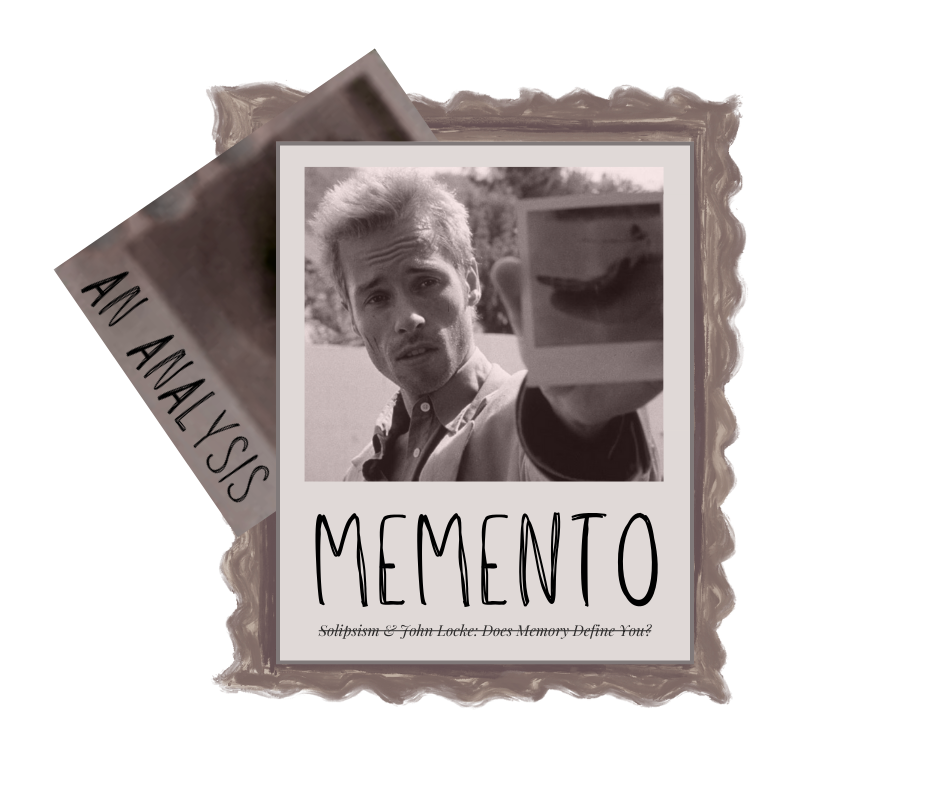.
_______________
Memento:
A Movie to Remember
_______________
_______________
A philosophical analysis of Christopher Nolan's breakout classic.
_______________
Memento Mori is “Remember that you must die”; Memento is a film to remember.
Christopher Nolan’s movie ricochets from the future to the past, in a sequence of ever-building snapshots depicting the life of Leonard Shelby. Weaving alternating snippets going forward and backward in time, yielding to a monumental finale of the plot collapsing in on itself, the thriller justifies again and again its acclaim as a cinematographic, artistic, and (more importantly) philosophical masterpiece. [1]
Following an attack which killed his wife Catherine and left him with anterograde amnesia, Leonard Shelby has spent days – months – more? – following a path to avenge her, chasing clues, writing notes, and staying alert long enough to know where to move forward when his memory resets. On his body are etched, in black ink, THE FACTS; any information he possesses about the attacker crawls on his skin, burned on flesh, not his mind. Every so often, he’ll notice his tattoos and, surprised, will undergo another round of revelations as to who, and for what, his purpose is.
A police officer accompanies him; he gives him advice, calls him, and occasionally takes advantage of Leonard’s memory. Leonard has him marked down as TEDDY, under a bright, winking photograph he took of the cop during one of their conversations. The description changes as the plot progresses, to TEDDY: DON’T BELIEVE HIS LIES, and, in haste: TEDDY: DON’T BELIEVE HIS LIES. KILL HIM.
Leonard also meets Natalie, who uses his condition to exact revenge on her boyfriend, but also provides useful information as to the identity of Catherine Shelby’s killer. When Natalie realizes Leonard’s intentions, she asks him whether or not it mattered if he avenged his wife, given that he’ll, in all likelihood, forget it ever happened. He answers that the outside world keeps existing even if we forget it; the world is still there when we close our eyes.
George Berkeley disagrees. In his A Treatise Concerning the Principles of Human Knowledge, he argues that “objects of sense exist only when they are perceived.” Between the frames, Leonard is alluding to object permanence, a quality most humans develop in childhood, which acknowledges the existence of objects past one’s line of sight. Turning away from a Lego set doesn’t mean that it disappears. Solipsism opposes this on a larger scale: one can only be sure that one’s own mind exists, and must question everything else. Regardless of whether something is perceived or not, it might not truly exist. From a logical positivist point of view, the debate is irrelevant; we know for certain that the world is there when we perceive it – what does the opposite, which is unprovable, matter? Logical positivism hinges on empirical evidence (derived from experience) and mathematical logic to determine truth. What you can’t experience or support logically doesn’t contribute to truth and should be set aside.
So there are three arguments: yes, existence supercedes perception; no, it doesn’t; and it doesn’t matter.
At this point, one must look up, look around, and repeat: what does it matter?

Ethically, if the world doesn’t exist without your seeing it, then those outside your purview are of no consequence; poverty loses its urgency, war – so long as you do not witness it – becomes, to you, obsolete. Solipsism is often criticized as a segway into Egoism (both philosophically and psychologically). The question stops being what does it matter? and takes the form of what do I care? There is danger in this, indeed.
Teddy is being held at gunpoint.
He shows Leonard a photo – color-copied, red-smiled proof – that they’d succeeded in their pursuit a year ago, that the real perpetrator had been killed by Leonard himself, that Teddy (really John G. Gammell) had thought this would bring them peace at last, to no avail. Leonard had continued to vie for the man who ruined his life, hell-bent on giving him justice. Teddy, defeated, had gone along with it, for the sake of upholding Leonard’s will to live; the ensuing victims were drug dealers and criminals, but never the “right guy”. It didn’t matter who Leonard killed, Teddy reasoned. He would just forget it. Leonard should be writing this down – another tattoo, saying I DID IT, for memory’s sake – but he doesn’t. He writes himself an unsolvable clue, something unfinished, a tail to chase that he knows will always be just out of reach.
The picture is burned.
Memento also calls into question the vitality of one’s memory to their identity. Regardless of his experiences after the fact, the film suggests that Leonard is the same person as he was the moment he developed anterograde amnesia. He commits murder and forgets it; is he, without recalling the crime, still guilty of it? The courts would convict him, though perhaps with a lesser sentence. John Locke, however, would characterize “Leonard the Murderer” and “Leonard Post-Murder” as different people. A person, to Locke, is a collection of memories; a veteran who loses any recollection of his service is not, at present, a soldier. Other philosophers have disagreed, arguing that memories – even the forgotten ones – continue to impact a person, characterizing them. Additionally, memory isn’t isolated, and a given memory’s (for the sake of clarity, Memory A) continuing effects on subsequent memories make a person forgetting Memory A still a product of its occurrence.
The veteran could still have battle scars. Leonard still has his tattoos.
Driving onwards, before he forgets anything else, Leonard closes his eyes. Is the world still there without him experiencing it? Is there a separate Reality, existing objectively, which his memory does not shape and where his actions have importance? He asserts, privately, that yes. Looking out, Leonard resolves that he will allow himself to manipulate his memory, and, consequently, who he is and will become, so that he can keep moving forward. All of this won’t matter in a moment.
For the time being, his mind shifts back to the road ahead of him and where he might have been headed.
[1]. Credit must be given to his brother, Jonathan Nolan, for the book that inspired the film. Further credit should also be given to Christopher Nolan when considering Memento was his second movie.
For Additional Reading:
- Recommended for solipsism: https://iep.utm.edu/solipsis/
- Recommended for Reid vs Locke: http://www.inquiriesjournal.com/articles/1683/the-lockean-memory-theory-of-personal-identity-definition-objection-response
Additional Sources:
- Nolan, C. (Director). (2000). Memento. [Film]. Summit Entertainment.

